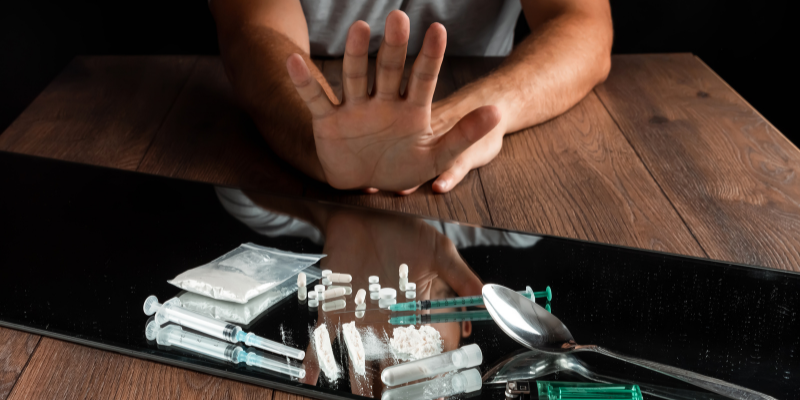
Many of the traditional methods of dealing with bad habits and addictions—such as “just say no”—aren’t working. This is because they don’t get to the root of the problem, which lies in the brain. Brain dysfunction is the #1 reason why people drink too much, use drugs, and can’t break their bad habits. The brain imaging work at Amen Clinics—more than 160,000 brain scans and growing—reveals valuable insights that the conventional medical community and traditional addiction treatment programs may miss.
Brain dysfunction is the #1 reason why people drink too much, use drugs, and can’t break their bad habits. Click To Tweet1. The brains of female addicts may show signs of past trauma.
The world’s largest database of functional brain scans—over 160,000 scans—that Amen Clinics has built shows that female and male brains are not the same. Some of the differences between the male and female brain can affect what you get addicted to and why. For example, women are at higher risk for sexual assault, domestic violence, and childhood physical abuse, which contributes to women being more than twice as likely to have post-traumatic stress disorder (PTSD) than men, according to the National Association on Mental Illness. Research at Amen Clinics using brain SPECT imaging shows that a diamond pattern in the brain is associated with PTSD. Experiencing trauma and having PTSD makes women more likely to self-medicate their negative feelings of anxiety or depression with alcohol, prescription painkillers, marijuana, or food (especially refined carbohydrates and sugary treats).
What you need to know: Dealing with past traumas and calming the emotional brain with targeted solutions is essential to stop self-medicating with alcohol, drugs, or food.
2. The brains of male addicts may reveal low activity.
Men, on the other hand, are more likely to be diagnosed with ADD/ADHD, which is associated with low activity in the brain’s prefrontal cortex (PFC). This brain region is responsible for judgment, decision-making, and impulse control. This makes males more impulsive and more likely to engage in risky behavior. They tend to seek out substances, such as cocaine, methamphetamine, nicotine, or high doses of caffeine in an effort to stimulate the brain. In many cases, taking stimulating substances makes them feel so amped they subsequently feel the need to drink alcohol or smoke pot to relax.
What you need to know: Addressing underlying ADD/ADHD with solutions that boost brain activity in the PFC is key to overcoming reliance on coffee, cigarettes, or illicit drugs.
3. Teens often have co-occurring mental health conditions.
Until the age of 25, young brains are going through a process called myelinization that wraps neurons in a protective coating that renders them more efficient. The PFC is the last part of the brain to undergo this process. This is why adolescents are more likely to say “okay” when a friend offers them beer, pot, or Ecstasy.
Young people who adopt bad habits or become addicted to substances often have co-existing psychiatric disorders, such as depression, anxiety, bipolar disorder, or ADD/ADHD. This is called “dual diagnosis.” The problem is that in traditional addiction treatment programs, these problems may be misdiagnosed since substance abuse can mimic symptoms associated with psychiatric conditions. Similarly, hormonal changes in teens can cause moodiness, sadness, and distractibility.
What you need to know: Brain imaging is so helpful in working with young addicts because it can reveal the toxic effects of substance abuse and can detect co-occurring disorders. Brain scans can help determine whether behavior problems are just a normal part of growing up, a symptom of addiction, or the results of underlying brain dysfunction.
4. Older brains are not immune to bad habits or addiction.
Certain age-related conditions can set the stage for the onset of troublesome behaviors or addiction in the graying population. For example, developing frontal lobe dementia can derail the PFC and lead to impulse control problems. Having coronary artery bypass grafting surgery to treat heart disease has been associated with subsequent cognitive impairment and increased risk of addiction and bad behaviors. In addition, many common prescription medications can alter brain chemistry and make older individuals who used to have healthy self-control fall victim to increased substance use.
What you need to know: Be sure to investigate any memory problems or cognitive issues and check if any medications may be contributing to your bad habits. Getting off those medications may restore better impulse control.
5. Neurohormone imbalances can trigger problems with alcohol or drugs.
Changing hormones in midlife can negatively affect the brains of both men and women, leaving them more vulnerable to problems with substances. Dr. Marvin “Rick” Sponaugle, founder and medical director of the Sponaugle Wellness Institute, which has successfully treated over 5,000 addicted patients, insists on the role of hormonal imbalances in addiction can’t be overlooked. For women, Sponaugle points to declining levels of progesterone, a calming hormone, during perimenopause as a source for anxiety and insomnia that drives women to abuse drugs and alcohol. Women who normally drink one glass of wine with dinner will progress to a couple of bottles of wine at night. He claims this is the case with more than 40% of the middle-aged females at his treatment facility.
What you need to know: Checking hormone levels and balancing them when necessary can be very helpful in breaking bad habits and in maintaining recovery.
6. There are 6 brain types associated with addiction.
Not all addicts are the same. Based on the brain imaging work with tens of thousands of patients, Amen Clinics has identified 6 types of addicts based on brain patterns: Compulsive Addicts, Impulsive Addicts, Impulsive-Compulsive Addicts, Sad or Emotional Addicts, Anxious Addicts, and Temporal Lobes Addicts. Each type comes with its own set of symptoms and requires its own treatment plan.
What you need to know: Knowing your addiction brain type is essential for finding the best interventions for your specific needs. Having more than one type is common, and it just means that you may need a combination of interventions to help you unchain your brain.
7. Inadvertently lowering brain activity can contribute to bad habits and addictive behaviors.
There are many things that decrease brain activity, which makes you more vulnerable to bad habits, addiction, or relapse. These include:
- Poor sleep or sleep apnea
- Dehydration
- Lack of exercise
- Taking certain medications
- Smoking
- Caffeine consumption
- Eating sweets
- Eating refined carbohydrates
- Having low blood sugar levels
- Exposure to mold and other toxins
- Having a head injury
What you need to know: Putting your brain in a healing environment with good nutrition, adequate sleep, and targeted supplements lay the foundation for breaking bad habits and recovering from addiction.
Addictions—as well as PTSD, anxiety, depression, ADD/ADHD, and other co-occurring issues—can’t wait. During these uncertain times, your mental well-being is more important than ever, and waiting until life gets back to “normal” is likely to make your symptoms worsen over time.
At Amen Clinics, we’re here for you. We offer in-clinic brain scanning and appointments, as well as mental telehealth, remote clinical evaluations, and video therapy for adults, children, and couples. Find out more by speaking to a specialist today at 888-288-9834. If all our specialists are busy helping others, you can also schedule a time to talk.





When you refer to brain scans are you referring to QEEG?
Comment by Renee — October 9, 2020 @ 5:38 AM
Interesting
Comment by Robert DuDonis — October 9, 2020 @ 6:06 AM
I was severly depressed for 10 years following menopause. A psychiatrist tried anti-depressants and nothing worked. He sent me for many ECT’s which didn’t work and has permanently wiped out a lot of memory. I saw a Naturopath who found that I had no hormones. She put me on bioidentical hormones and I have been doing great for years. I wish that I would have found out about them sooner!
Comment by Diane Morse — October 9, 2020 @ 6:26 AM
That was very insightful! I have a somewhat bad habit i’m planning to disrupt. Hopefully the techniques mentioned here can help (unfortunately i don’t have access to brain scanning). Again, thanks.
Comment by Mohammad Omar — October 9, 2020 @ 7:58 AM
Would like more information, please.
Comment by Rosalinda Aguilar — October 9, 2020 @ 7:59 AM
Hello Rosalinda, thank you for reaching out. We’d be happy to contact you directly.
Comment by Amen Clinics — October 9, 2020 @ 8:24 AM
Hello Renee, thank you for reaching out. At Amen Clinics we perform Brain SPECT scans, here is more information for you: https://amenclinics.com/approach/why-spect/.
Comment by Amen Clinics — October 9, 2020 @ 8:25 AM
Hi I’ve been post menopausal for 3 years and had a concussion 16 months ago. I have really bad symptoms of anxiety depression and not feeling myself mentally. Not sure if I should take HRT or would the symptoms be from the concussion. They were bad before the concussion but after my fall they have been worse.
Comment by Jane — October 9, 2020 @ 11:09 AM
Do you have or know of clinics in Australia… Melbourne?
Comment by Jessie — October 9, 2020 @ 1:25 PM
I have many bad habits: Trichotilomania, Shop-a-Holic. skin-picking, depression (diagnosed by psychiatrist), constant movement when I’m sitting down, chronic pain, and many more. These habits were managed by me a variety of ways when I was younger. Now I am 70 and this load is crushing me. I had a fall down basement stairs at age 3 and another bad fall at age 37. Do you think you can help me. I have a lovely home and wonderful husband and a great new puppy…everything I ever wanted….but I can’t enjoy it…I feel like I am imploding.
Comment by Sandy — October 9, 2020 @ 11:48 PM
closest treatment clinic to south florida?
Comment by lea webb — January 12, 2022 @ 5:31 PM
Hello Lea, thank you for reaching out. Amen Clinics is planning on opening a Florida clinic this year. Until then, our closest clinic to Florida is our clinic in Atlanta (https://amenclinics.com/locations/atlanta-metro-area/). For more information about scheduling, please contact our Care Coordinators: https://amenclinics.com/schedule-visit/.
Comment by Amen Clinics — January 13, 2022 @ 10:24 AM